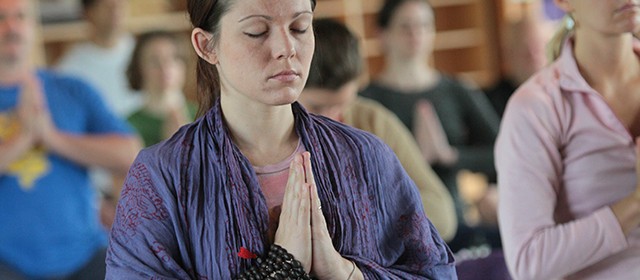Loving-Kindness, Resilience, and the News Cycle

The human capacity to rebound from suffering inspires me. Life knocks people all the way to the ground, yet again and again we gather the spirit to rise and embrace our lives. Recently, many people I have met in my travels tell me they are having a tougher time getting back up, because they are exhausted and dispirited by the news cycle. They don’t want to feel themselves pushed and pulled by exterior events, yet it’s hard for them to look away.
People tell me how, as soon as they wake up, sometimes while the room is still dark, they reach for their phones. The feedback loop starts with phone in hand, inches from their face, light from the screens filling their eyes and minds with events and opinions. As the bulletins stream before them in this cramped intensity, the sense of the body disappears. They begin their day already fatigued by the news.
Even after they put the phone down, they are still in its grip, struggling with how to make a positive contribution. The cascade of information they’ve absorbed makes small actions seem futile and, in the face of defeat, imagining bigger actions may strike them as impossible. Our politics have fostered bitterness and anger, and the fights we are having are not just disagreements about policies, but emotional and heartfelt. When you lose one of those battles, hopelessness often drains the energy to bounce back and reengage with the world.
I find myself overwhelmed reading about the children separated from their families at the borders. It has been so painful to think of them that many of us cannot linger long in the terrible feeling this reality creates. We want to disconnect to protect ourselves, and to numb the pain of not being able to help in any clear or direct way. When action seems like a pointless gesture, it’s hard to find the energy for resilience. A woman I met in New York described being drained by watching one news show after another in a numbed state of vigilance. To remain engaged in the fight for the things we care about, we need an off button, a boundary, a way to retreat from the news so we can replenish our spirits.
One of the foundations of resilience is a long-term perspective. Sometimes we think nothing is happening, when in fact there are forces we cannot detect moving toward change, on a timetable of their own. We might be at the beginning of a change that will take years, or it could happen next week. Patience is part of resilience, and patience is the opposite of what you feel when you are gripped by the news cycle. And because we can't know, we need to slow down and remain ready for a long fight. Don’t squander that anger and anxiety, as you may need it for bigger action soon. Instead, alongside your concern for suffering, foster loving-kindness as a foundation of resilience.
Loving-kindness, or metta, is a Buddhist practice of articulating heartfelt wishes to oneself, another, or the world. With sincerity and an open heart, we concentrate on repeating a few phrases: May you be safe. May you be peaceful. May you be free of suffering. If we close our eyes and repeat these simple sentiments, often we can feel a profound connection to the beauty of the world, to another, and to all beings, including ourselves.
In that spirit of loving-kindness, I offer Metta for the Children, one minute when I urge people to stop whatever they are doing and allow me to guide them in sending loving-kindness to the children at the border who are suffering through a sadness larger than they have every experienced. The first #MettaMinute was in June, and I will offer another on Wednesday, October 16, at 3:00 pm Eastern time.
While this practice is simple and caring, I have found, in decades of teaching it, that it is not easy to understand. This is certainly what I experienced when I announced this initiative. Immediately, some called it frivolous. What would wishing the best for the children do when no action was associated with the sentiment?
Many doubt the power of metta, comparing it to the cliché of “sending thoughts and prayers.” Others fall back on magical thinking, believing that if we all concentrate very hard simultaneously, the children suffering in the detention centers will feel a wave of love. That is not what metta is about, either.
We all need to connect to something larger, and metta practice is one of the tools for that. Metta is the foundation of action. The words connect us and create a positive energy of inclusion. The disconnection and dehumanization that is the basis for this cruelty can overwhelm people and leave them feeling powerless to act. Sitting together in a metta practice emboldens us by connecting us to others who feel the same way we do. Metta gives us strength to move forward to actions that will not allow these children to be forgotten.
For the first #MettaMinute, I was in the Salt Lake City airport on my way to Sun Valley, where I was teaching. I walked to a quiet corner of the lounge and put on my headphones. I heard my own words, reminding everyone who listened how that feeling of not being forgotten is essential to our worth as people. Here’s what I said:
“To the families currently held in ICE detention, especially the children, loving-kindness is a simple practice of sitting with your thoughts while calling to mind genuine compassion for others. There are countless beings to include in our loving-kindness—limitless, actually—so may this be the first of our limitless minutes of practice. May our loving-kindness be the basis of the actions we take to try to ease the suffering in this world. So take a minute wherever you are today. Feel your body, and breathe in, out; in, out; in, out. Settle yourself as you call to mind these children and families, knowing that their vulnerability is echoed within us. Their love for one another is just like ours. Offer to them the deepest wishes of your heart by silently repeating, May you be safe, be peaceful, be free of suffering.”
I looked around the airport to see if anyone else there might be joining me in this. While I saw plenty of people wearing headphones, some with their eyes closed, there was no way I could discern if they, too, were sending loving-kindness to the children. I know thousands did, and many took this minute in the spirit it was intended. One woman tweeted: “When I invited friends to the metta minute, I said, ‘Then follow w/action for justice, peace, equality & compassion.’”
I offer metta meditation as a reminder not to disconnect from the beautiful qualities that form the basis of your concern for the suffering that is all around us. Those qualities are part of what makes us human—but remember that it is okay to have a boundary and a limit. This is how we can stay present in the face of what is painful and difficult. I do not confuse loving-kindness with action. Rather, I remember that loving-kindness, as the Buddha said, is the antidote to fear. A sense of love and connection to the world, radiating from a clear and open heart, is vital to generating a more positive energy. The protection and strength that loving-kindness offers help us remain ready to do our part to ease suffering when the path of action becomes clear.
Sharon Salzberg is a pioneer in the field of meditation, a world-renowned teacher, and New York Times best-selling author.
Full Bio and Programs
